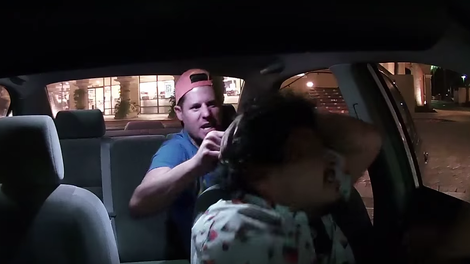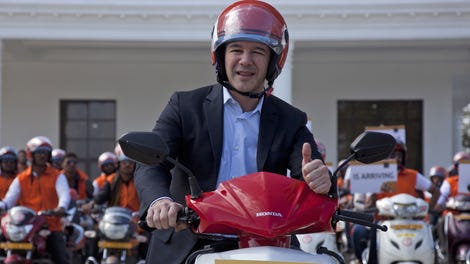
I’d like to say that I’ve never given Uber money, but that wouldn’t be true. Not exactly. I did give Uber money once, years ago, when I had no other option. The company promptly ripped me off, and I wasn’t surprised. Why not? I worked in the same office as Uber in its early days. I could sense those fuckers were evil from the start.
Now that the bricks of Uber’s multibillion-dollar edifice are officially tumbling down, exposing the company’s noxious and abusive inner workings, my boycott feels like it’s paying off. Obviously, it’s not actually paying off. I’m not making any money by avoiding Uber during the crumbling period of Silicon Valley’s once-beloved house of capitalism. (Although I certainly saved a lot of money by boycotting Uber.) Uber’s fall is paying off in the form of what I’d call moral dividends. I spent years arguing with friends, not only pointing out that Uber seemed like a bad company run by bad people but also making the case that giving money to a company like that would only enable those bad people to do more bad things. I was not wrong.
Before I end up sounding too smug, let’s just review the latest Uber news.
Advertisement
The company’s CEO, Travis Kalanick is on the cover of Time Magazine underneath a flaming pile of Uber cars. The illustration is designed to look like the Uber app, and Kalanick has a half-star rating. “UBER FAIL” reads the headline, and the accompanying feature tells the story of a company in crisis.
Following an investigation into sexual harassment, discrimination, and retaliation, Kalanick is taking a leave of absence for an undetermined period of time, as the company attempts to overhaul its historically tumultuous inner workings. A week before this news, a separate probe into over 200 allegations of harassment at Uber led to the firing of more than 20 employees. And quite fittingly, as Uber board member Arianna Huffington was explaining all of this to the company’s staff on Tuesday, a fellow board member, David Bonderman, made a sexist remark in Huffington’s direction that ignited outrage on social media. The old, white man resigned hours later.
So all that happened in the month of June, and June is only halfway over. If the Time cover story is any evidence, nobody thinks this behavior from Uber is acceptable any more. We probably haven’t heard the last jaw-dropping revelation from the company’s ranks either, as more and more employees leak embarrassing memos that cast Kalanick and his cronies as overgrown frat boys with keys to a castle they intend to trash. After all, it was a former employee who sparked the recent sexual harassment investigations, and she surely wasn’t the only one made victim by Uber’s toxic corporate culture.
Advertisement
None of this should surprise you, though. Uber’s been a toxic company for years. By the time my friends started raving about Uber, I had grown even more skeptical of this new company that ignored local regulations and trampled on the taxi industry in its grand quest for global dominance. It seemed obvious early on that Uber could even become dangerous, since the company didn’t appear to vet or train its drivers properly.
I knew this about Uber because, very coincidentally, I had worked alongside their New York team in a Brooklyn co-working space called the Yard. A freelance journalist at the time, I’d rented a desk and sat right outside of the Yard’s conference rooms, where Uber employees in their early 20s trained aspiring Uber drivers. The training amounted to Uber employees teaching drivers how to use the company’s app and sending them off to pick up passengers. Something about the whole exchange seemed unusual, even irresponsible.
Within a year or two, stories of Uber drivers abusing passengers and Uber passengers abusing drivers started to emerge with alarming frequency. There was a terrifying incident in 2014, when an Uber driver held a passenger prisoner during a high-speed police chase. Later that year, Uber customers filed a class action lawsuit against the company, because Uber started to charge a “safe rides fee,” after an Uber driver beat a passenger’s face in with a hammer.
Advertisement
And who could forget 2015, when a drunk Taco Bell executive assaulted his Uber driver for not obeying his orders? This was around the same time Uber was starting to catch heat for refusing to treat its drivers like employees and offer basic benefits like health insurance. The year 2015 was also when urban planning experts started to shout about how Uber’s purported mission to revitalize cities and solve their transportation problems was utter bullshit.
Suffice it to say, the events of 2016 did not make Uber look any better, either. The driver benefits debate raged on, as Uber started paying out millions of dollars in fees for violating regulations. Then there was the Uber driver-turned-serial-killer who murdered six passengers in Michigan. Don’t even get me started on Uber’s secret programs to dupe Lyft drivers into picking up non-existent passengers and to evade law enforcement officers who were investigating the company’s possibly illegal activities.
You get the point. Uber is a bad company run by bad people, and it always has been. After witnessing the dodgy training sessions and reading about Uber in the news, I decided early on to boycott the service. My friends would eventually drag me into Ubers they had ordered. I insisted on taking yellow cabs whenever I had the choice. Meanwhile, my sister actually became an Uber driver. She quit after her first ride, because she felt unsafe.
Like I said at the start, though, I did pay for one Uber ride. It was a rough day. I’d just moved into a new apartment and decided to take the subway to Ikea, where I bought a bunch of flat-pack furniture for an affordable price. The only problem was that the black car service was completely booked and regular taxis weren’t allowed to pick people up at Ikea. Uber was my only option, so I downloaded the app and picked the cheapest service available. After loading my things into the trunk, I got in the backseat annoyed, and the driver informed me that since I’d put stuff in the trunk, he was required to charge me the most expensive rate. I argued. He said it was Uber policy. I argued. He offered to leave me at Ikea, and I relented. He told me to ask Uber for a refund. Uber never responded to my request.
Advertisement
Looking back, my bad Uber experience was actually pretty good. I did get ripped off, but I didn’t get assaulted, sexually harassed, discriminated against, bankrupted, or any of the other awful things on Uber’s long list of abuses. That one experience did make me feel better about my boycott, like I’d been right all along. But what’s happening with Uber lately, man, it feels like vindication.
The only problem? It doesn’t feel good. Uber’s coup de grâce is simply proof that the company has fucked over a lot of people since its doomed inception, eight years ago. I’m not happy the company is finally getting its just deserts. I’m honestly as pissed as ever that Uber even exists, that people like Travis Kalanick got rich by abusing others, that the company will probably continue to do bad things and make billions of dollars for years to come. That’s what we’ve come to expect from Silicon Valley’s brand of capitalism, though. It sucks, but it’s what’s left of the American dream.
















